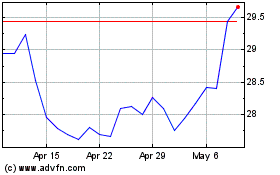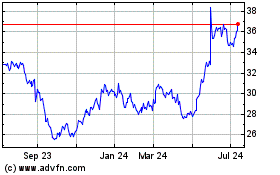Xerox Secures Funds for HP Bid -- WSJ
January 07 2020 - 3:02AM
Dow Jones News
Move signals the company's intent to move ahead on its
unsolicited offer
By Cara Lombardo
This article is being republished as part of our daily
reproduction of WSJ.com articles that also appeared in the U.S.
print edition of The Wall Street Journal (January 7, 2020).
Xerox Holdings Corp. said Monday it has secured financing for
its takeover offer for HP Inc., a sign the printer-and-copier
company is pushing forward with an unsolicited $33 billion bid that
its larger rival has resisted.
Citigroup Inc., Mizuho Financial Group Inc. and Bank of America
Corp. have agreed to back Xerox by lending up to $24 billion, the
company said in a public letter from Xerox Chief Executive John
Visentin to HP's board.
The Wall Street Journal first reported on the financing earlier
Monday.
Xerox on Nov. 5 made a cash-and-stock bid for HP, whose market
value has since risen to almost $30 billion, making it nearly four
times Xerox's size. HP rejected the bid as too low and not in the
best interests of its shareholders. It also cast doubt on whether
Xerox would be able to raise the cash portion and whether the
combined company could handle the amount of debt it would likely
require.
At the time of the bid, Xerox had only an informal funding
pledge. The new commitments represent a vote of confidence by major
financial institutions in the logic of the deal and the combined
company's ability to generate adequate cash flow. It also
underscores Xerox's desire to be the buyer in a potential
combination, according to people familiar with the matter, after
some analysts have suggested it could be hoping for HP to buy
it.
Xerox has argued the two companies, which both operate in the
slowing printing industry, could yield cost savings of more than $2
billion by combining forces. They had previously discussed a tie-up
but weren't in talks when Xerox offered $17 in cash and 0.137 of
its shares for each HP share, or $22 a share.
While HP in its original rejection expressed a willingness to
discuss a deal to combine with Xerox, the situation turned
contentious when the two sides couldn't agree on terms to examine
each others' businesses.
Activist investor Carl Icahn has stakes in both companies and
supports a combination. After HP rejected Xerox's bid, Xerox said
it would take its case directly to HP shareholders. The two sides
have since been separately courting shareholders in an attempt to
gain their support.
Should HP continue to be unreceptive, it is conceivable that Mr.
Icahn or Xerox would launch a proxy fight at HP in the coming
weeks.
Xerox primarily makes large printers and copy machines, while HP
mainly sells smaller printers and printing supplies. HP is also one
of the biggest PC makers in the world, though its printer business
is more lucrative.
Both companies' stocks have remained elevated since The Wall
Street Journal reported in November on Xerox's plans to make an
offer. HP's shares rose more than 1% in morning trading Monday,
while Xerox's fell less than 1%.
Write to Cara Lombardo at cara.lombardo@wsj.com
(END) Dow Jones Newswires
January 07, 2020 02:47 ET (07:47 GMT)
Copyright (c) 2020 Dow Jones & Company, Inc.
HP (NYSE:HPQ)
Historical Stock Chart
From Mar 2024 to Apr 2024

HP (NYSE:HPQ)
Historical Stock Chart
From Apr 2023 to Apr 2024
